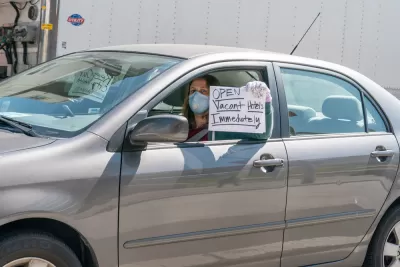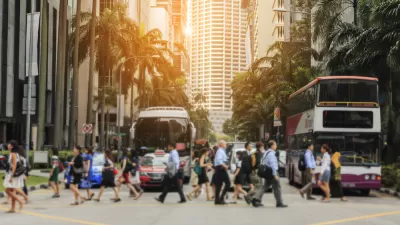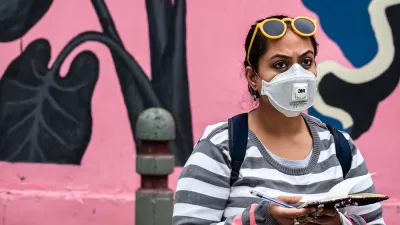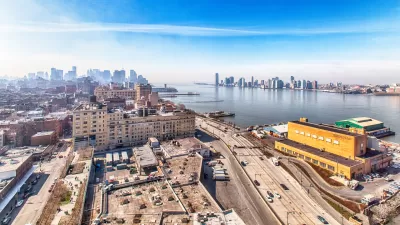Some cities are leasing entire hotels to provide rooms for people who have tested positive for COVID-19 or been exposed to infected people, to allow for safe and supportive isolation away from family or household members who risk being infected.

Some American cities, including New York, Austin, and San Francisco, have taken a page from crowded Asian cities that have successfully contained the coronavirus by booking hotel rooms, or leasing entire hotels, to isolate individuals away from their homes where they risk infecting family members or roommates. Supportive services are needed to monitor the isolation.
A post by Bloomberg Cities on Medium for the COVID-19 Local Response Initiative, a new program funded by Bloomberg Philanthropies to help local leaders combat the coronavirus, describes how hotels can provide two of the four key containment strategies of disease control in the public health playbook.
Quarantine and isolation of all exposed and infected people are critical steps to stop the spread of COVID-19. So critical, in fact, that they make up two of the four steps Dr. Tom Frieden has told mayors are necessary to “box-in” the virus.
That’s why some cities have started to turn empty hotels into isolation centers for people who have COVID-19 but don’t require hospitalization.
The other two steps in COVID-19 containment are testing and contact tracing, a program that identifies individuals who were exposed to people who test positive for COVID-19. The post looks at leasing hotels and hotel rooms for isolation and quarantine purposes in New York City, Austin, San Francisco, and the smaller cities of Chelsea and Revere, a partnership, outside of Boston.
New York City is offering 20,000 "hotel rooms to residents with mild symptoms of covid-19 so they can isolate to avoid spreading the virus to members of their household," reports Drew Jones for The Washington Post on May 7.
While they’re in isolation, patients will be provided with food, access to a pharmacy and laundry service, according to Mark Levine, chair of the New York City Council’s Health Committee. In addition, each isolation site will have clinical staff on hand for daily checkups and EMTs ready to respond in the event of an emergency.
“As we move into this next phase of this crisis and as hospitalizations hopefully continue to decrease, hotels remain a key component of our test and trace plan,” the mayor’s office said in a statement to The Washington Post. “Our isolation hotel program currently provides for a range of needs, from supporting health-care workers on the front lines to individuals from congregate settings.”
The program may have inadvertently contributed to the death of four COVID patients last month who had been discharged from hospitals, showing the importance of the supportive services that are meant to accommodate the individuals, reported Ashley Southall and
The deaths exposed holes in the way the city monitors isolated patients and underscored the difficulty in containing the outbreak in New York City: how to keep people who have been infected or exposed to the coronavirus from passing it on.
However, the program shows the importance of distinguishing density from crowding in New York City, the topic of a Streetsblog post last month by Brent Toderian.
Austin, Texas also has an ambitious program of leasing hotels and motels for "emergency housing, isolation and support services related to COVID-19," reports Daniel Salazar for the Austin Business Journal on April 26.
The Crowne Plaza [in North Austin] is being used as "Isolation Facility #1" and had 102 people staying there at most recent count. The other two hotels [a La Quinta Inn in South Austin and a Motel 6 in North Austin] are being used as protective lodging for people experiencing homelessness that are high-risk if they get the coronavirus and can't practice social distancing in their current location.
As the pandemic has ground business and leisure travel to a halt, the hospitality industry is suffering from devastating vacancy rates and lost revenue. For example, by one estimate, hotels in Austin's Central Business District had an occupancy rate of around 3% in early April.
The Mission Local reports on May 11 that San Francisco Mayor London Breed announced that "[a]ny San Franciscan who is COVID-19 positive and cannot self-isolate is now eligible for a hotel room through the city."
Several hundred hotel rooms that had been reserved for frontline healthcare workers will be repurposed to meet this end, she said. “We had not used as many of those hotel rooms as we anticipated,” Breed said.
Chelsea, the epicenter of the coronavirus outbreak in Massachusetts, partnered with the neighboring city of Revere, to lease a Quality Inn hotel with almost 150 rooms for recovering COVID patients through the first week of June.
"Both Revere and Chelsea have many residents who simply cannot return to untenable housing situations and properly isolate themselves when they are diagnosed with COVID-19," said Chelsea City Manager Tom Ambrosino, reported the local NBC affiliate. "And as a result, the spread is greater in these communities than it is elsewhere."
“If you’re an older urban city with lots of crowded housing, you’re going to face this problem,” he told Bloomberg Cities. “This is an effective way to mitigate the spread of the virus, but it’s a very expensive proposition.”
However, to qualify, patients must live in either city, showing the limits of these programs. The program is run by Partners Healthcare, a Boston-based non-profit hospital and physicians network not to be confused with Partners in Health, the non-profit group that is operating the statewide contact tracing program.
Boston has gone a different route by repurposing the Boston Convention and Exhibition Center into a 1,000-bed facility called Boston Hope for those who are covid-19 positive but do not require acute hospitalization, writes Five hundred beds are reserved for covid-positive homeless people.
The other quarantine
Hotels are also being used for another quarantine function – isolating travelers entering a nation or even a state for precautionary purposes, as opposed to those found from contact tracing. In Hawaii, travelers must quarantine for 14 days in their hotel rooms, which they pay for, as part of Gov. David Ige's stay-at-home order to mitigate the spread of the coronavirus. If they leave their room, they can be arrested, which has created enforcement problems for the hotels, as described by the Associated Press.
A more uplifting version of "hotel quarantine" for travelers comes from Singapore where the government pays for "five-star" treatment of residents returning from overseas.
Related in Planetizen:
-
NIMBY Politics Sway the Fight to Contain Coronavirus [by leasing a state-owned facility], March 4, 2020
FULL STORY: How some cities are using hotels to help ‘box-in’ the virus

Study: Maui’s Plan to Convert Vacation Rentals to Long-Term Housing Could Cause Nearly $1 Billion Economic Loss
The plan would reduce visitor accommodation by 25,% resulting in 1,900 jobs lost.

North Texas Transit Leaders Tout Benefits of TOD for Growing Region
At a summit focused on transit-oriented development, policymakers discussed how North Texas’ expanded light rail system can serve as a tool for economic growth.

Using Old Oil and Gas Wells for Green Energy Storage
Penn State researchers have found that repurposing abandoned oil and gas wells for geothermal-assisted compressed-air energy storage can boost efficiency, reduce environmental risks, and support clean energy and job transitions.

Santa Barbara Could Build Housing on County Land
County supervisors moved forward a proposal to build workforce housing on two county-owned parcels.

San Mateo Formally Opposes Freeway Project
The city council will send a letter to Caltrans urging the agency to reconsider a plan to expand the 101 through the city of San Mateo.

A Bronx Community Fights to Have its Voice Heard
After organizing and giving input for decades, the community around the Kingsbridge Armory might actually see it redeveloped — and they want to continue to have a say in how it goes.
Urban Design for Planners 1: Software Tools
This six-course series explores essential urban design concepts using open source software and equips planners with the tools they need to participate fully in the urban design process.
Planning for Universal Design
Learn the tools for implementing Universal Design in planning regulations.
Ascent Environmental
Borough of Carlisle
Institute for Housing and Urban Development Studies (IHS)
City of Grandview
Harvard GSD Executive Education
Toledo-Lucas County Plan Commissions
Salt Lake City
NYU Wagner Graduate School of Public Service





























